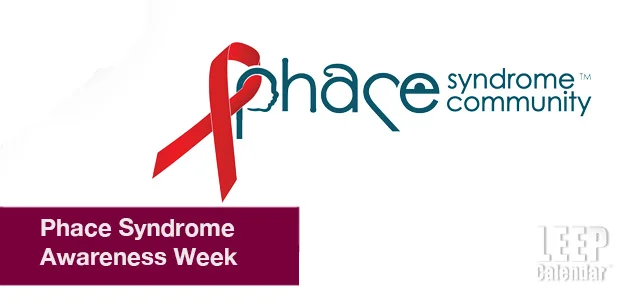 AD
AD
Today is: November 25
Scroll to explore events active on this date.
Additional Events on LEEP
LEEP INK FEATURES

Nuanced November 2024
November is the start of the holiday season in many parts of the world. It is a time for family, football, food, shopping and decorating, particularly in the Christian and Jewish world, leading to Christmas and...

December's Gift
Events in December 2024. Well, we made it to December. December is the holiday season, particularly in Western nations, where Christianity and Judaism are the faiths most common in the nation's past. ...

August is Appropos
A toddler playing in the fountain at a park in Santa Fe, New Mexico—Photo LD Lewis. In August, we live through the Dog Days of Summer. It's hot and often humid, and those ...
About Phace Syndrome Awareness Week
Family & Friends , Children
Ends: Mar 24, 2024
DESCRIPTION:
International Phace Syndrome Awareness Week raises awareness about Phace Syndrome and supports families affected by the condition.
Phace Syndrome is a rare disease that affects multiple body systems and is characterized by several abnormalities that co-occur more frequently than expected. The acronym PHACE stands for Posterior fossa anomalies, Hemangioma, Arterial anomalies, Cardiac anomalies, and Eye anomalies. These represent the disorder's most common signs and symptoms. The syndrome is more prevalent in girls than in boys, and the severity and specific symptoms can vary significantly among affected individuals.
Most children with PHACE Syndrome do not exhibit all the major symptoms associated with the disorder. The most conspicuous sign of Phace Syndrome is often a hemangioma, an overgrowth of blood vessels, which typically appears on the face, head, or neck. The exact cause of Phace Syndrome is currently unknown.
The treatment for Phace Syndrome varies based on the specific symptoms and their severity. It often involves a multidisciplinary approach, including specialists in dermatology, cardiology, neurology, and ophthalmology. Treatment may include medications, surgery, or other interventions to manage the symptoms.
The Phace Syndrome Community and The Phaces Foundation of Canada established the awareness week to create awareness about the syndrome. It includes various activities such as webinars, research on the disease, and viewing educational videos to increase understanding of what Phace Syndrome is and how to improve the health and quality of life of those affected.
VIDEOS
Currently, this event does not have supporting videos.
SUPPORTING DOCUMENTS
Currently, this event does not have supporting documents.
ADDITIONAL IMAGES
Currently, this event does not have supporting images.
Where would you like to go now?
 AD
AD


/footer-logo.svg)
